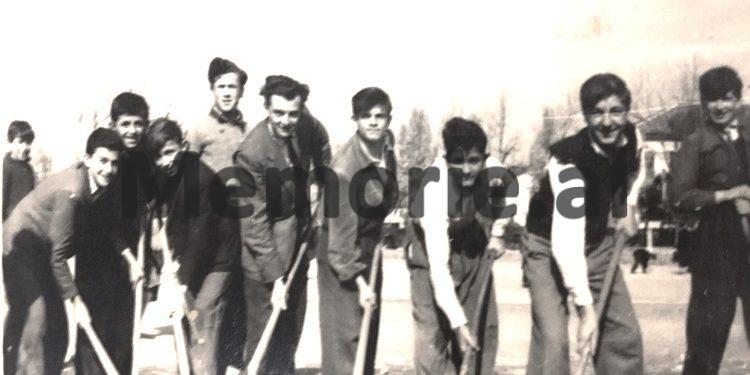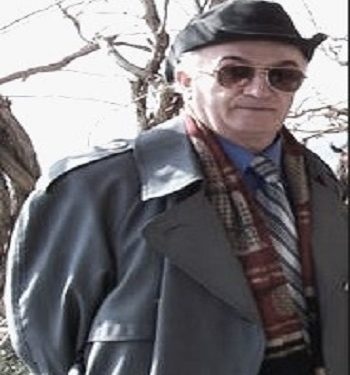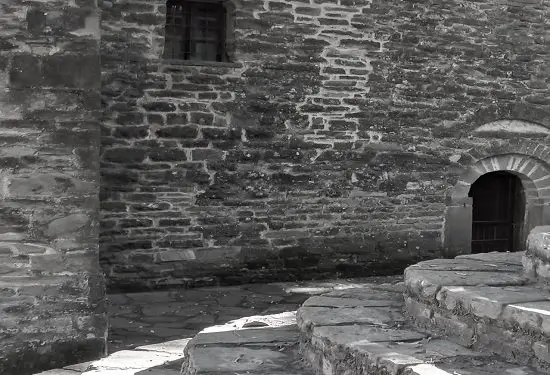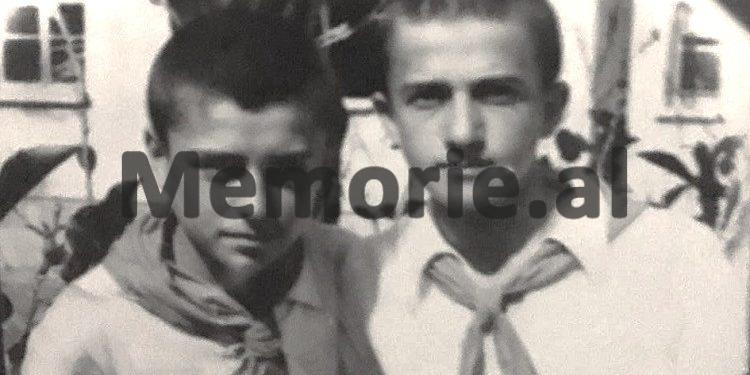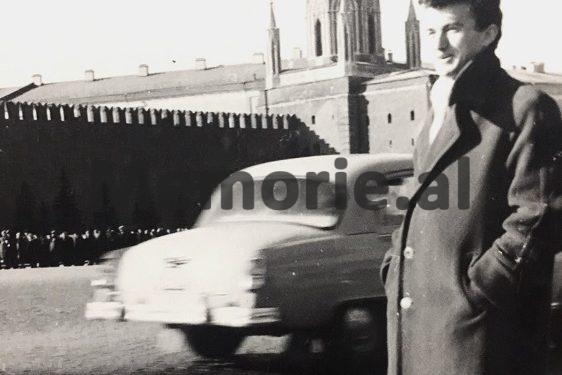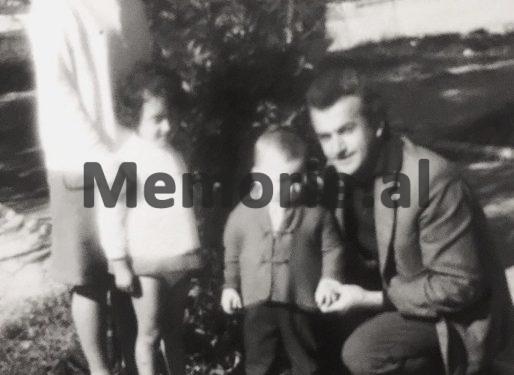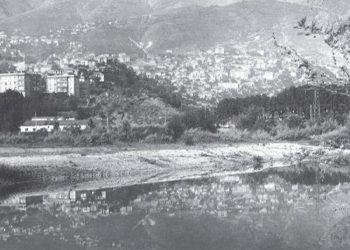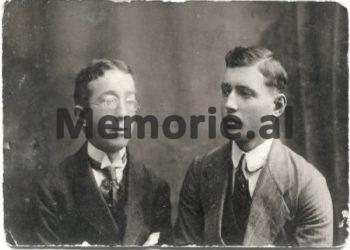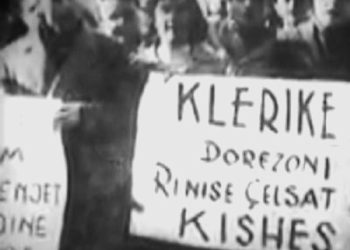From Sokrat Shyti
Part nine
Memorie.al / The writer Sokrat Shyti is the “great unknown” who, for several years, has revealed the tip of the iceberg of his literary creativity. I say this based on the limited number of his published books in recent years, primarily the voluminous novel “Nata fantazmë” (Tirana 2014). His novels: “PËRTEJ MISTERIT”, “MES TUNDIMIT DHE VORBULLËS”, “GËRRYERJET E MAKTHIT”, “HIJA E TURPIT DHE E VDEKJES”, “KOLONELI KRYEDHJAK”, “SHPRESAT E NËMURA”, “PËSHTJELLIMET E FATIT” I, II, “MBIJETESA NË KASOLLEN E LOPËS”, as well as other works, all novels ranging from 350 to 550 pages, are in manuscript form waiting to be published. The dreams and initial excitement of the young novelist, returning from studies abroad full of energy and love for art and literature, were cut short early on by the brutal edge of communist dictatorship.
Who is Sokrat Shyti?
Having returned from studies at Moscow State University, right after the rupture of Albanian-Soviet relations in 1960, Sokrat Shyti worked at Radio “Diapazon” (which at that time was located on Kavaja Street), in an editorial office with his journalist friends – Vangjel Lezho and Fadil Kokomani – both later arrested and subsequently executed by the communist regime. Besides the radio, Sokrati, at the age of 21, if we may imagine, had passionate literary interests at that time. He wrote his first novel “Madam doktoresha” and was on the verge of publication, but… alas! Right after the arrest of his friends, to fill the cup, a brother of his, a painter, fled abroad.
Sokrat was arrested in September 1963, and in November of that year, he was sent into internment (together with his mother and younger sister) to a location between Ardenica and Kolonje in Lushnja. For 27 consecutive years, the family lived in a livestock shed made of reeds, without windows, while Sokrat was subjected to forced labor. During these 27 years, he was legally obligated to report three times a day to the regional authority. He had no right to move from the place of internment and was deprived of any kind of documentation, etc. In these conditions, among a livestock shed, he gave birth and raised his children. It was precisely from this event, or rather a very long history of persecution, that he was inspired to write the book “Survival in the Livestock Shed”!
Agron Tufa
Continued from the previous issue
EXCERPT FROM THE BOOK, “SURVIVAL IN THE COW SHED”
“Exactly this point made the promises seem lacking,” explained the school director in a calm voice, in order to remove the feeling of opposition from himself.
“Do I need to wait until the second notification from you to inform my mother?” I added to reinforce the level of certainty.
“I’m glad you have patience and are a mature boy!” said Kolit’s father.
“But regarding your temporary employment, there is no room for doubt. Therefore, let your mother know and embrace her as soon as you return home, so that she can be happy and smile a little after two bitter months, filled with pain and despair. Starting tomorrow, at 8 in the morning, you will report to the directorate, as here you are completely at ease, working without interference until the end of the teaching cycle. You will only use my fountain pen and ‘Pelikan’ ink.
You must keep in mind: if in the old Amza, you encounter inaccuracies in spelling, where ‘j’ is used instead of ‘i’, or vice versa, and instead of ‘e’, or in some adjectives the final letters change from ‘e’ to ‘i’; for example, Mone becomes Moni, which in fact are two different adjectives, the clarification will be made in cooperation with the Primary Civil Registry, because only based on this registry can the truthfulness of the name and surname, paternity and maternity, or the relevant data be verified.
There must be full compliance between the new Amza and the Primary Registry. To achieve high quality, there is no norm, as you need to fill so many pages every day. The primary importance is the accuracy of spelling, clarity, and beauty. Kolit will be very happy when he returns home for summer vacation and I tell him that you have been employed at the school.”
“Will he spend his vacation here, or will he go to Divjakë?” I asked.
“According to the saying; ‘Either by the sea or near the King,’ Divjakë attracts me more. Because there you find all the joys of the age, including dairy products, fruits, and fresh vegetables, which are lacking here. You know that the citizens of Lushnja make efforts to secure a beach cabin. As for my family, they have the chance to spend their vacation in normal conditions, at our relatives’ houses…!”
“All childhood friends are envious that Koli has this wonderful opportunity!” I said, standing up, pleased that my important goal of employment had been successfully fulfilled, and even the fortunate chance exceeded all expectations. Because I never imagined finding such a job that I could perform without difficulty, requiring only attention, care, beautiful writing, and correct spelling.
I returned home with a sense of relief, liberated from the constricting shadow of death, which held me tightly within the shell of guilt. It felt as if at that moment I was coming from the hospital, and after talking to my father, the hope of recovery was rekindled, even though this factually had been near my brother’s grave for two months, at the church of Golem, where they were discussing the most painful issue: why has our large family diminished so much!? But this thought did not last long. When I entered the room and saw my mother grieving, I dismissed this thought. My heart trembled at the terrifying fate that had followed me so closely! Death had shown itself to be greedy towards her: it had swallowed half of the family!
“At least it should not have taken her husband, her life partner, so they could grow old together!” I was indignant at this injustice. And under the pressure of an inner revolt, I strongly embraced her, kissing her hands and forehead. To free myself from this anguish, I remembered the postulate of wise people that life for the living continues after every horrific event, even when death takes away the most beloved people.
“Did you go out to see a friend, or did you visit your older sister?” she asked to know where I spent my time.
“First, urgent matters need to be resolved, and then meetings can be held,” I replied.
“Did you have a message from a school friend and went to his house?” she insisted.
“None of my friends found out that I would return home before the exams. Because curious questions would start, why the rush, when I myself was confused…!”
“Your father, may he shine where he is, until his last moment, maintained clarity of thought. He patiently explained why you should not be present at the escort of the coffin to the church of Golem. Therefore, focus your attention on the necessary preparations,” he advised me.
“But fortunately, my work friends and the Church took care of everything and performed with honor and dedication. The whole of Lushnja attended the funeral. A memorial service was held at the Church of Golem, by order of the Bishop of Berat. To fulfill the wish of the deceased to be buried near his son, the Holy Synod and the Church Council decided to open a new row. After death, all honors were paid. Yet, when he was alive…?!”
“This shows that society has always loved and respected him!” I interjected. “All that care was a continuation of the appreciation while alive. There was no pretense in this ceremony, or forced attendance, as happens in some cases when a ruler is escorted to their final resting place. That is why I felt proud when Mukja described the burial ceremony to me in detail! Your husband and our father received a magnificent send-off, according to his merits, despite the fact that politics did not favor it, as it has always kept him outside its orbit, disregarding him!”
“My soul aches that he didn’t see a fair day!” said my mother with a deep sigh.
“Why does this happen: wise people, who have a big heart, are marginalized by society, and are sometimes attacked?” she asked.
“Because rulers generally have narrow minds and dark souls,” I replied. “Even when someone occasionally shows humanity towards the needy, they are quickly punished!”
“You didn’t tell me where you were today,” she returned to her initial question.
“I met the director of my school, not only to thank him for showing the proper care to inform the principal of the Gymnasium, but also for another very important matter.”
“Is it related only to you or to our family as well?” she interjected with a curious glance.
“It concerns all of us!” I replied, kissing her hands. And I immediately explained why I went and what was achieved in that meeting.
“It seems like a dream!” she said, astonished. “How did this thought come to your mind?!”
“You know that I can’t stand idly by without work. It’s not just that we have a lot of needs after father’s death, but even if we had a source of income, three months shouldn’t be wasted,” I said.
“This work is tiring and carries great responsibility?” she asked, worried.
“An action without effort and responsibility is not called work,” I replied.
“Did you know that in school, this was the job, which is why you went?” …
“I went to ask for assistance, where I should turn. He smiled and said happily: you have come as if commissioned. Then we talked extensively. To avoid placing him in difficulty before the boss, I openly expressed my doubt that perhaps this job was reserved for their person. Even though my doubt lingered, he dismissed it with some arguments that convinced me. So tomorrow I start working.”
“So soon?!” she was surprised. “Isn’t there going to be a committee meeting, as they usually do?”
“This is temporary work. For such cases, decisions are not made; one word is enough. – Did the boss say this?” … she wanted to make sure.
“The director presented sufficient convincing conditions that cannot be overturned by anyone,” I added to dispel her opposing conjecture.
“But let’s say you’ve been accepted and you start work tomorrow. What will your schedule be?” she inquired.
“Just like when I was a student at this school: work starts exactly at 8 in the morning and ends at 2 in the afternoon.”
“Will you have breakfast here at home, or will you take it with you?” she asked.
“Mom! The workplace is just a couple of steps away from home. Of course, I will have breakfast here. My work is so focused that even the slightest distraction troubles me. That’s why the director told me I would work in his office,” I explained to calm her down. “While on Sunday morning, which is my day off, I plan to dedicate it to father and brother, at the Church of Golem!” I added with tear-filled eyes.
“Thank you, O God, for giving my little son this wisdom and great heart to comfort me, when my soul burns from pain inside, like ash!” she sighed.
The next day, before 8 a.m., when the school bell rang to signal the start of the lessons, I found myself in the workplace, and the school director was showing me how to check the Old Amza, so that I wouldn’t make mistakes.
“First, take a careful look to ensure there are no corrections and retouches. Then focus carefully on each column. Besides writing the names, pay close attention to the notes taken by the class teachers, especially the correspondence between the numbers and the written observations. Any ambiguity, as we discussed yesterday, you will leave unfilled and move on to the next page. Here’s the fountain pen and the ‘Pelikan’ ink.
May your new job go well!” he said, shaking my hand. “If someone knocks on the door and asks where the director is, you will answer shortly: I don’t know. Or to avoid such disturbances altogether, I’ll lock the door from the outside so you won’t have any interruptions. If you need to go to the bathroom, here’s a spare key inside the drawer. Then lock it from the inside and remove the key from the lock. Is that how we’ll leave it?”
“That’s a good solution, as I won’t waste any time answering and my concentration won’t be broken from work,” I replied.
After the director left and I locked the door with the key from the outside, I took a careful look at the tools I would use and focused on reading the first ten pages of the Old Amza. Then I tried on a notebook page to see how the fountain pen wrote, to ensure the tip was dispensing ink (the only irreparable action that placed a heavy responsibility on me since it could render the entire block of Amza unusable). When I was convinced that the tip of the fountain pen was releasing enough ink, I felt relieved. After this test, I performed another action: I lightly underlined the spelling mistakes in the Old Amza with a pencil, so I would keep them in mind and not waste time when I wrote them properly.
Since this was work, I had never experienced before, I had no idea how it would consume me and how much I would feel the fatigue of six hours of stooping! I was surprised when I heard the key clicking in the lock and saw the director: I had lost track of how many hours I had been working. So, I stared at him as if I were in a daze.
“You haven’t moved from your spot at all?!” he exclaimed, glancing over the pages written in the Old Amza. “With this strained pace, you’re harming your health!” he chastised as he flipped through the written pages. “You’ve done perfect work! You can take pride in seeing it! I feel it’s necessary to establish a normal work rhythm: I will order the school janitor to ring the bell at the end of each lesson and the beginning of the next hour. During those intermediate minutes, you will take a mandatory break, where you will drink a glass of water and eat some fruit…” he added with a smile. “I brought you figs, pears, and apples from our garden in Divjakë.”
My eyes filled with tears from the kindness shown towards me! His calm tone of voice, composed movements, sweetness of voice, and paternal demeanor created a feeling as if my father were right there beside me! Because he showed almost the same attentiveness when I worked in the shop: he often bought me simite with meatballs, lamb’s liver, or grilled kukurec, since I was special and didn’t eat ordinary meals. (Even at home, my mother would cook me the special part of the meat). There was a resemblance between my father and the school director. This similarity significantly eased the pain of loss and, in a way, helped me renew myself every day after the shock.
On Sunday morning, around 9 o’clock, our neighbor, Mukja, along with his mother, Kadea, came to our house. Mother Kadea exclaimed with joy when she saw me, overwhelming me with extraordinary affection, squeezing me tightly as she did back at the well during the bombings. So I said in a childlike voice: “Take it easy, you’re crushing me!” They, mother and son, burst out laughing at the memory of that moment. Then she embraced me again. We both missed each other! We felt happy just being close to one another! We could have continued for minutes on end, reminiscing about the past, had it not been for Mukja, who told us that a car was waiting for us down the street to take us to the Church of Golem. Mother Ana’s eyes lit up with joy at this news!
“Kade! Out of the three boys, Mukja is the one who eats bread apart from the others. He hasn’t left you anything!” she told her. She hadn’t expected this extraordinary care. She didn’t know how to thank Kadea, that her son would find her a car to go to the graves of her son and husband, considering the long distance and that walking would tire her out severely.
As we slowly descended toward the street, two by two, I told mother Kadea softly to take care of Ana, to hold back as best as she could so that the weeping at her son’s grave wouldn’t be accompanied by distressful wailing, mentioning the most painful memories that would chill the heart.
She promised she would do her utmost to restrain it, as she had that in mind since they left home. Therefore, during the drive, they sat together so that Kadea could discreetly communicate any necessary instructions.
“Mothers, even though they differ in outward appearance, some are taller and some shorter, feel the same internal pain for the loss of their beloved ones, and therefore understand each other very well,” Mother Kadea replied to me.
The military “jeep” drove us for two minutes to the hill of Golem. When we were getting ready to get out, the driver told us that we hadn’t arrived yet. He took the car off the road, drove down the hill, and after a turn, began ascending through the traces of another vehicle, close to the Church building. Here he stopped, explaining that he was not allowed to proceed further because the cemetery grounds began.
“I’ll wait here in the car,” he addressed Mukja.
“Don’t rush. I don’t have any urgent hurry from the commander or the brigade commissioner.” Mukja told us to follow him until we reached the front part of the Church. Then he took Mother Ana by the arm, while I took Mother Kade. I was left stunned and amazed when I saw above the two graves of father and son, the numerous wreaths from the day of the funeral, more than two months ago!
Those seeing it for the first time, and who didn’t know what had happened, would be led to believe from the flower wreaths that the deceased had died on the same day or very close days, because no one would believe that father and son were buried in different years, with the son passing away eight years ago, since both graves were covered with a multitude of wreaths on the same day!
“What happened that day that you still haven’t told me?” I asked Mukja reproachfully.
“On the day of your esteemed father’s funeral, the most wonderful solidarity was shown among the residents of our city,” Mukja whispered back. “When your brother’s peers learned that their father would be buried alongside him, they ordered wreaths for the unforgettable friend! It was a wonderful act that shook us all. Never before had love and respect for the deceased been shown like this time! Mother Ana felt as if her son had passed away on that same day from the deep sorrow for his father’s death, as he left this world in his embrace! That is why the graves are close to each other, filled with floral wreaths!
At that moment, the priest of the church came to us to greet the two mothers dressed entirely in black, then me and my neighbor. The prayer began, murmuring supplications, mentioning my father’s name from time to time. Then he gave us candles to light, and blessed the two graves with the holy cross and incense, sprinkling them with blessed water while repeating loudly, ‘May the soul shine in the Heavenly Kingdom of God!’
“Every Sunday we hold a short memorial service for the first psalmist of the Church, by order of the Chief Priest,” he added, especially for me, so that I could hear from his mouth how much the Church honors the distinguished believer, Thanas, making a pious prayer once a week. I thanked him for his kind attention, kissed his hand, and added that my father dedicated a part of his life with passion to the service of the Church and the believers, delivering God’s messages with his voice.
“I will find the right time to thank Father Petros and Father Konstantin for the grand service of devotion that was organized here specifically. I will never forget that the coffin with my father’s lifeless body stood on the epitaph during the mass and left through the door of this Church to be escorted to its final resting place!” … – I felt it was my duty to express my family’s gratitude and my own to the special care of the Holy Synod and Church Council for the magnificent burial ritual, as well as for covering the expenses, including the funeral lunch. The priest blessed me with the holy cross and emphasized that the Church’s care for the first psalmist does not end there.
“By order of the Chief Priest, our church attendant performs daily service at the two graves, that of the father and son: lighting candles and pulling weeds around,” he pointed out.
“In addition, we occasionally bring fresh flowers, mainly roses!” he added, casting a sharp glance at me. “I believe you noticed them…?”
“They immediately caught my eye. Right at the moment you arrived, I was about to ask my wonderful friend who had brought these beautiful roses?” I replied, quite pleased.
“We told your esteemed mother not to worry at all about the maintenance of the two graves, as our church attendant is very diligent; he knows where to find fresh flowers…” he emphasized to calm the distraught lamentations of Mrs. Ana, who at that moment was about to shed tears filled with sorrow, gathered within her, trembling her heart and soul./Memorie.al
To be continued in the next issue
Copyright©“Memorie.al”
All rights to this material are exclusively and irrevocably owned by “Memorie.al”, in accordance with Law No. 35/2016 “On Author’s Rights and Related Rights”. It is strictly prohibited to copy, publish, distribute, or transfer this material without the authorization of “Memorie.al”; otherwise, any violator will be held liable under Article 179 of Law 35/2016.




